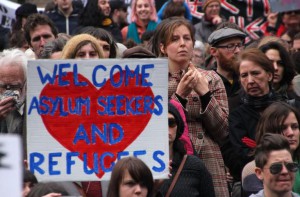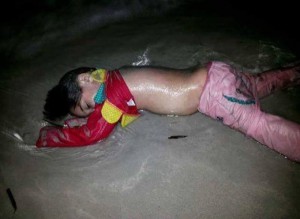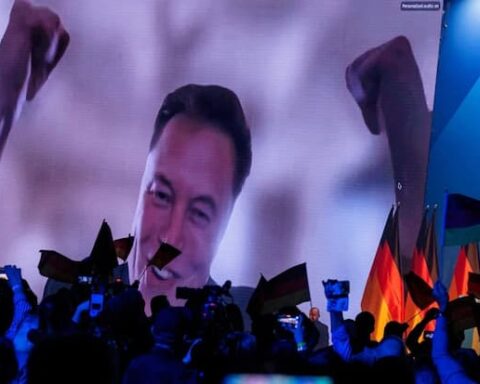While other European leaders and governments are continuing to argue and prevaricate and avoid action or responsibility in regard to the escalating migrant crisis, Angela Merkel and Germany have led the way in humanitarianism and responsibility and have set a standard and an example.
Germany is now expecting to receive 800,000 asylum seekers this year (and probably more than that, in all likelihood), and Merkel has declared the country will accept Syrian asylum requests irrespective of whereabouts in the EU the refugees happen to arrive.
What Germany has done is to put border concerns, petty politics and games aside, and to act in humanitarian terms and take the larger burden onto itself. This being while David Cameron and other EU leaders were still oscillating back and forth between one viewpoint and another, with each pointing a finger at other countries and quibbling over who ate what and how much they should be contributing to the bill.
More than this, the welcome given by German citizens to the refugees arriving at German train stations has been something genuinely special to observe and has given some dignity and humanisation back to the thousands of refugees who’ve been subject to maltreatment, humiliation and cattle-like herding and containment through most of the various stages of their perilous journeys: particularly inhumane treatment in places like Hungary and Macedonia.
Arriving refugees were cheered and applauded, while signs and banners were erected saying ‘Refugees Welcome’ and other similar statements of support.

Scores of ordinary German citizens volunteered to help the refugees who are now arriving daily. Some filled up their cars and distributed clothes, food and even children’s toys and cuddly bears. Others have offered immediate German lessons, translation services and even babysitting. A German MP, Martin Patzelt, from Angela Merkel’s own CDU party, has himself housed two refugees from Eritrea, who are now living with him temporarily at his home in Brandenburg.
The Berlin-based group, Refugees Welcome, has been a big part of this story, and matches refugees with people willing to give them a room, and has been inundated with offers from German citizens to house or host incoming migrants. More than 780 Germans have signed up to this program. Police in Munich in fact had to advise the public to stop bringing donations, as they had been so inundated so quickly. In recent months the “Refugees Welcome” banners have even appeared at the grounds of some German football clubs, including Hamburg’s FC St Pauli. Dynamo Dresden has handed out free tickets to 300 refugees, while third-division Berlin team SV Babelsberg 03 has even started a third team made up entirely of refugees, called ‘Welcome United’. Top German club, Schalke 04, released a video of the team expressing solidarity with refugees, accompanied with the hashtag #StandUpIfYouAreHuman.
Katie Griggs, a British woman who’s lived in Berlin for several years, is among those who responded to the Refugees Welcome campaign and registered with the website earlier this year and almost immediately welcomed a pregnant Nigerian migrant into her two-bedroom flat.The Nigerian refugee had been referred to Katie Griggs and to Refugees Welcome by another group in Berlin which tends specifically women victims of trafficking. Katie’s WordPress blog can be seen here.
This welcome in Germany and the actions of ordinary German citizens should also answer the much-asked question doing the rounds elsewhere as to why the refugees ‘don’t just stay in the country they arrive at’ – the reason they’re headed for Germany is because Germany is where they are welcomed and the treatment they receive in Germany is vastly different to the treatment they’ve been receiving in Hungary or elsewhere.
After years of brutal Civil War funded and prolonged by foreign governments and then months of desperate, perilous, travelling, the last thing most Syrian refugees expected in Europe was to be treated like an unwanted ‘swarm’ or a nuisance, in some instances even subject to racist taunts and abuse.
In Germany they were finally received as human beings with human rights.

Syrian refugee, Monis Bukhari, who was given asylum in Berlin two years ago, is using Facebook to organize a “Thank you Germany” event on October 10th. In this planned event, Syrians who’ve been welcomed into Germany will play music and hand out flowers randomly to Germans at stations across the country as a collective expression of gratitude to the nation that has taken so many of them in.
Some of this same spirit of charity has also been echoed in, for example, Austria and Iceland. In Austria, the current mood had been described as one of ‘pride’ for the way the government has handled the crisis in recent days and for the overwhelming response from ordinary people arriving with donations of food, water and clothing for incoming refugees at train stations in Vienna and Salzburg. This response from the people was in fact so overwhelming that, by Saturday afternoon, Viennese officials were reported to be asking well-wishers and donators to stay away from the stations.
Some Austrians are reported to have been driving to the border in private cars and buses in order to give wearied, exhausted refugees a lift into Vienna.
In Iceland, the author and professor Bryndis Bjorgvinsdottir set up a Facebook page to call for her highly progressive government to increase the number of refugees it is planning to accept, and her campaign prompted a massive response. It was a fellow blogger, Saine, who first informed me of the Iceland campaign and suggested it should be a path for British citizens to follow.
This idea gathered momentum quickly and the page already has over 12,000 members; this being in a country whose population is only about 300,000. A widely-reshared post on her page expressed a view that captured the feelings and views of many, “Refugees are human resources, experience and skills. Refugees are our future spouses, best friends, our next soul mate, the drummer in our children’s band, our next colleague, Miss Iceland 2022, the carpenter who finally fixes our bathroom, the chef in the cafeteria, the fireman, the hacker and the television host. People who we’ll never be able to say to: ‘Your life is worth less than mine.'”
Björgvinsdóttur’s ‘Syria Calling’ campaign is said to be reverberating throughout the Icelandic government and potentially influencing Iceland’s official policy.
________________
In Britain, whose government has been far more reticent in offering asylum or assistance to the refugees (despite its leading role in the destabilisation of Syria, Iraq and Libya), a number of ordinary citizens and campaigners are trying to do the same thing and establish a network of British citizens willing to house Syrian refugees. ‘We are looking for offers of 10,000 homes across the UK’, says their webpage.
If you are willing or able to offer potential accommodation to a Syrian refugee, or can offer other support, then please visit their “I Want to Help” page.
The current British Establishment, which with its key allies (the United States, Saudi Arabia, Qatar, Israel and Turkey) has been pursuing a destructive, catastrophic geopolitical policy in the Middle East for many years now, is still evidently reluctant to give sanctuary to the many, many victims of those policies.
Britain’s general reaction to the migrant crisis, as with much of Europe, has been sadly lacking. The migrant boats have been sinking for months, yet it wasn’t until a single, tragic image of a young Syrian boy washed up on the beach in Kos got shown all over the media that a wider outcry began. There have been plenty of other young children drowning at sea too – not to mention thousands of children being killed in Syria for years now – and there was nothing like the same kind of mass-media reaction or front-page newspaper coverage.
But one image of one tragic boy not only seemed suddenly to wake up the media, but even appeared to force David Cameron to a do a complete u-turn overnight and agree to take 15,000 refugees.
Which indicates that David Cameron – one of the chief destroyers of Libya – has absolutely no idea what’s going on or what his position is. For months Cameron and other Euro leaders have been leaving the beleaguered nations of Greece and Italy to bear the brunt of the migrant crisis, while making glib statements about solving the crisis at its source rather than taking in migrants (says one of the men responsible for turning Libya into the migrant-trafficking hub it now is and one of those involved in arming and aiding extreme terrorism in Syria).
It is simply shirking responsibility and trying to pretend that the disaster he and his government helped create isn’t happening. The fact also that it took the images of the poor Syrian boy in Kos to make so many more people sympathise with the refugees also demonstrates either how ill-informed or how uninterested so many people have been.
Newspapers have been broadly omitting such images and stories from front-page coverage for a long time, along with the fact that, for example, there’s a massive humanitarian disaster occurring in Yemen right now as a result of Saudi Arabia’s indiscriminate bombing of the country, which is being done largely with British weapons and American support.
Even just a few days ago, a Facebook user named Khaled Barakeh uploaded multiple photos to the platform, showing numerous children who’d washed up dead off the Libyan coast after having been on a capsized migrant boat. The mass media didn’t bother picking up on these particular images, despite the images being shared some 90,000 times in just that one day. Facebook then deleted the post and removed all the images within a day of them going up (see image below – and I apologise for showing a harrowing image, but in this case it needs to be done).

What Germany has done and has been doing – both the government and so many of its ordinary citizens, and despite violent protests from some less-tolerant sections of its society – is something that may be remembered for a long time to come.
Conversely, what various European governments – along with the US and the Saudis and the wealthy Gulf States – aren’t doing is also something that may be remembered for a long time to come too.
Germany has shown Europe how to do compassion. Whether the rest of the EU starts taking more of the responsibility and relieving Germany of some of the strain remains to be seen.
_______________





Reblogged this on The Militant Negro™.
Reblogged this on TheFlippinTruth.